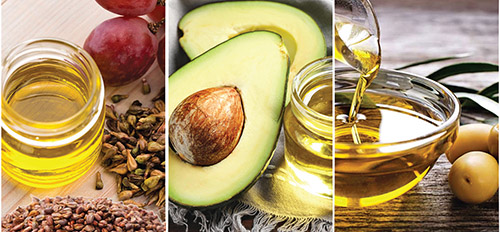



(Courtesy of De La Rosa) Have you ever made a quick trip to your local grocer in need of cooking oil only to find yourself completely intimidated by all the varieties on store shelves? When it comes to choosing the right culinary oil, it might be hard to decide where to start. The internet is flooded with often contradictory information about oils—bogus health claims and cooking myths, just to name a few—so it’s best to compile reliable information and become familiar with how the oils are processed. While your choice will probably be based on a variety of factors, keeping in mind how the oil is processed is one of the easiest ways to make a healthy decision.
“Consumers are being persuaded by mass-marketing to believe that some popular, widely used oils like canola, corn and soybean are ‘healthy.’ But once educated on how these oils are made, it’s clear they are totally unhealthy and overprocessed,” explained Yehudith Girshberg, CEO of De La Rosa Real Foods & Vineyards. For more than 30 years, De La Rosa has been committed to helping consumers make healthier choices by providing oil, vinegar and wine products that are non-GMO, gluten-free, vegan, kosher (many kosher for Passover) and organic whenever possible. This specialty food manufacturer is also committed to providing education to consumers on how to choose healthier products with the purest production processes.
Many of the oils we use today in the kitchen are made from seeds. In order to get the oil from these tiny seeds, they can either be mechanically or chemically processed. These processes are known as solvent extracted, expeller pressed or cold pressed. Most solvent-extracted oils go through an enormous amount of processing with chemical solvents, steamers, neutralizers, de-waxers, bleach and deodorizers. The “solvent” most often used to extract the oil is the neurotoxin hexane, and it’s been shown that some of this toxic chemical residue can remain in the oil despite the refining process1. By using culinary oils that don’t explicitly label the process, consumers could very well be eating solvent-extracted oils.
Expeller pressing and cold pressing use no toxins during the mechanical process of extraction. This traditional way of making oil is significantly healthier than using hexane; however, less oil is made and the process is more expensive. Which is why manufacturers continue to produce the less expensive, chemically processed oils that are mass-marketed with flimsy nutrient claims and misleading label lingo. And because they are cheap to produce, solvent-extracted oils are commonly found in processed foods. Browse through the ingredient labels the next time you’re at the grocery store and you’ll find an array of products like salad dressings and condiments containing solvent-extracted oils. Read the labels carefully and avoid consuming these products if possible.
“How an oil is produced isn’t always clearly marked so choosing culinary oils that document and label their products is the best way to ensure chemical-free and high quality. This is why consumers can find De La Rosa expeller-pressed grape seed oil clearly labeled hexane-free. We work on the formulations of all of our products to make them as healthy as possible, always using the fewest ingredients and eliminating anything in the production process that we feel is potentially harmful. Keep it simple; less is more,” said De La Rosa CEO Yehudith Girshberg.
Educating yourself about the quality control of your culinary oil product is essential. Products that maintain the highest possible level of flavor, aroma, color and nutritional richness should always be the goal. Keep your eye out for features on retail packaging—compare labels, compare prices and most importantly choose an oil that is produced without chemical treatment.
1 Mojtaba Yousefi, Hedayat Hosseini (2017) Evaluation of Hexane Content in Edible Vegetable Oils Consumed in Iran . Journal of Experimental and Clinical Toxicology – 1(1):27-2.










